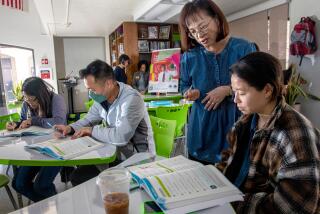Far East Link : Cal Lutheran students are learning more about contemporary China, thanks to two visiting scholars-in-residence.
- Share via
Lisa Eyler, a 19-year-old political science major at California Lutheran University, has never been to China. But thanks to a special program, Eyler and fellow students have learned about events and issues in contemporary China from two visiting Chinese scholars-in-residence. Part of the program involves educating students on some of the particular problems facing China’s senior citizens.
Since arriving on campus in August, Professors Mohe Zhu, 63, and his wife, Meiling Liu, 56, have given lectures on religion, education and women’s issues, as well as the cultural, social and political scene in China.
“The Zhus have been so well received on campus, that their one-semester stay has been extended to a full year,” said Zhu’s countryman, Edward Tseng. Tseng, a professor of political science and dean of international studies at Cal Lutheran, arranged this exchange after meting the Zhus in 1985. “Our university has formal relations with Fudan University in Shanghai and Zhongshan University in Canton,” Tseng said. “They are among the top five universities in China.”
Before retiring two years ago, Zhu was a faculty member and administrator at Zhongshan University. He is a computer science expert and has written three books on Chinese word-processing.
“But since retiring, I have devoted my full time to reading scientific journals and presenting lectures about Chinese culture in English to foreign students,” Zhu said. Liu is a specialist in high school and university curriculum development.
Eyler, a sophomore, just completed Tseng’s Introduction to East Asian History class. “I appreciated the added dimension that Dr. Zhu provided,” she said. “I’ve enjoyed Dr. Tseng’s presentation of facts and his experience. Dr. Zhu would give his perspective from a slightly older generation and an inside view of China.”
Most Westerners harbor an image of China’s older population as a respected group valued for its wisdom and living out its days in the nurturing bosom of large, multi-generational families.
But life is rapidly changing for senior citizens in China, Zhu recently told students. “The problem of the aged suddenly appeared in China.”
The number of Chinese age 60 and older is expected to exceed 10% of the nation’s total population by the year 2000. Moreover, the current life expectancy of 70 years has doubled since 1949.
“Though children have the duty to support their parents,” Zhu said, “most young couples find it difficult and expensive to care often for two sets of old parents.”
Zhu listed five problems facing senior citizens in both America and China--financial support, medical care, education, entertainment, and contributing to society after retirement.
Besides enriching campus life with their lectures, Zhu and Liu open their apartment weekly for a Chinese cooking class for members of the faculty and staff. Shelly Kallen, assistant director of the Women’s Resource Center, attends the sessions with her new Chinese daughter-in-law, Natalie.
“It’s about more than just eating,” faculty secretary Ponja Davenport said. “We also learn about geography and customs in various parts of China.”
* FYI
Beginning in February, the Zhus will continue their series of free public evening lectures about contemporary China. For details, call (805) 493-3450.
More to Read
Sign up for Essential California
The most important California stories and recommendations in your inbox every morning.
You may occasionally receive promotional content from the Los Angeles Times.










